Texas Tech University Archives
Texas Tech Black History Timeline
For Texas Tech's charter (founding) centennial, the Texas Tech University Archives curated a large exhibit titled "Education Has No Color: Celebrating Black History at Texas Tech" that was displayed in the Library's Croslin Room from January 17-March 16, 2023. This page provides a brief overview of Black history at Texas Tech University. The timeline is not a comprehensive one, but rather focuses on major milestones and events in the university's ethnically diverse history, including firsts, groundbreaking events, notable figures and their achievements, and some racial controversies that happened at the university.
Biographies of individuals honored in the annual exhibit are featured on the Distinguished Black Red Raiders page.
The Timeline of Underrepresented Groups at Texas Tech is a broader overview of the history of underrepresentated populations at the university.
1923
February 10, 1923 - Senate Bill No. 103 (commonly referred to as the school charter) was signed by Governor Pat Neff, creating a new co-educational college for white students in West Texas to be named Texas Technological College. The two references for white students [only] in the school's charter would later be one of the integration hurdles that had to be addressed by the university's president and Board of Regents.
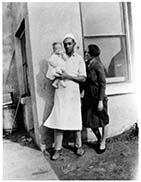
1925
The earliest documented African Americans in relation to Texas Tech University were Charlie, Selma, and Snookie (left). Charlie was the cook at the College Inn, a boarding house for female Tech students located at 2448 15th Street. There was no on campus housing available during the college’s early years. Charlie was mentioned in the "College Inn Col Yum" articles in the 1925 Toreador campus newspaper.
1941
William Dudley Johns first began working on campus installing Drane Hall’s kitchen in its first year of operation. Later he became the campus post carrier. Over the next 31 years, the amiable Johns was a popular figure among the students, staff, and faculty and was mentioned in several campus newspaper articles. He was first pictured and profiled on page 6 of the November 12, 1952 issue of The Toreador titled “Mail Man Dudley a Tech Favorite.”
1951
Corporal Thomas I. Bowser and Private First Class Joseph A. Finlayson, two 18-year old airmen stationed at Reese Air Force Base, sought to attend night classes at Texas Tech but were rejected on the grounds that the college was only open to white students. It is worth noting that Asian, Hispanic, European and South American students were enrolled in the college beginning in the early 1930s. (The Toreador, August 17, 1951)
1952
The Toreador newspaper reported in February that the University of Arizona threatened to stop participating in Texas Tech athletic games unless Texas Tech changed its policy of banning African American athletes from participating in home games. Texas Tech athletic teams had played against other teams that had African American members but only at away games. (The Toreador, February 12, 1952) In a December editorial, Associate Editor Ann Bryan praised the Board of Directors decision to allow African Americans to participate in intercollegiate athletics and authorize the use of Jones Stadium for an all-star African American game. (The Toreador, December 12, 1952)
1955
An Oxford style debate was held in February centering on the question of whether Texas Tech should open its doors to African American students. This type of debate allowed for audience participation. Over 200 students attended the debate. (The Toreador, February 10, 1955, The Toreador, November 4, 1955, and the Texas Techsan magazine, February 1955).
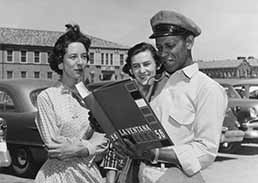
Popular mailman, Dudley Johns, was profiled and pictured in the campus newspaper. (The University Daily, November 22, 1955)
1956
The 1956 La Ventana yearbook (pages 6-7) was dedicated to Dudley Johns (left), the campus mailman, declaring "His infectious smiles and friendliness have made the community of Texas Tech a better place in which to live. His cheerful hellos and indefinable ability to remember names and faces have added many a spark to otherwise normal days."
1957
Dudley Johns was selected by the Sophomore class to serve as master of ceremonies for the Old Southern Hodge Podge dance held in the Recreation Hall, during which a “Beau” and “Belle” would be crowned. Voting and the dance was open to all student classifications and attendees were encouraged to wear “old South costumes.” (The University Daily, March 1, 1957)
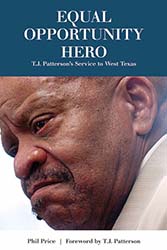
1958
Thomas James "T.J." Patterson moved to Lubbock in 1958 to work with his aunt, Lucille Sugar Graves, at the Mary & Mac Private School.
1959
According to book, Equal Opportunity Hero: T.J. Patterson's Service to West Texas (p. 57; published by Texas Tech University Press in 2017), Patterson attempted to enroll as a graduate student at Texas Tech, but was refused entrance based on the color of his skin. Following being drafted by the military and then his aunt's entrance into Texas Tech in 1961, T.J. was finally able to enroll in graduate classes at the university in the spring and fall of 1973.
1960
Three educators at the Mary & Mac School - Lucille S. Graves, T.J. Patterson, and Granvel Overstreet - applied for and were denied entrance to Texas Tech University.
1961
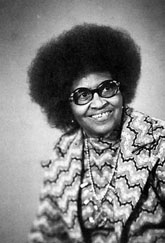
In the summer of 1961, Lucille S. Graves (left) was the first African American to gain official entrance into Texas Tech. Her persistent attempts to enroll in the college opened the door for others to attend. She also established the Mary and Mac School in 1955, which was the first black private school in Lubbock. The Lubbock County Historical Commission placed a historical marker on the school's structure on July 11, 2014. (Link to the AJ's article about the site dedication).
The official announcement that the university would accept applications from African American students in the fall was made on July 17th by Mayor David Casey, on behalf of the Texas Tech Board of Directors. (Lubbock Avalanche-Journal, July 17, 1961)
The July 21st issue of The Toreador announced that African Americans had enrolled at Texas Tech for the first time, though the names of the students and their number were not revealed. Katie Parks' 1999 book, Remember When? A History of African Americans in Lubbock, Texas, states fifteen Black students enrolled in Texas Tech in the fall of 1961, including Ann Burrell, Stella Crockett, Ann Crowder, Eddie Duson, Lydia Jackson, Mary McKelvey, Shirley Nathan, James C. Price, Mattie Rutherford, Bobby Williams, and Diana Wilson (p. 107). Burell, Crockett, Price, Rutherford, and Williams were the first Black students to join the Goin’ Band under band director Dean Killion. Two additional students, Robert Crockett and Walter Marlin, were also identified as joining the band, though it is unclear whether they were among the first 1961 group to do so.
1963
December 7, 1963 - The Board of Directors approved integrating the school's intercollegiate athletic program. Texas Tech was the fifth school in the Southwest Athletic Conference to lower the sports color barrier. Classrooms, dormitories, and other Tech facilities were already integrated. (The Toreador, December 10, 1963 and the Lubbock Avalanche-Journal, December 8, 1963)
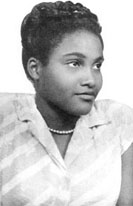
December 10, 1963 – In a unanimous vote, the Student Council “went on record” supporting athletic integration. Business Administration representative Kent Hance introduced the resolution and called for support of the Athletic Council in any decision it made regarding athletic integration. Hance was appointed by Student Council President Royal Furgeson to head a study of Tech's position on Southwest Conference athletic integration. (The Toreador, November 20, 1963 and December 11, 1963)
1964
Ophelia Powell-Malone (left) was the first African American to receive a Bachelor's degree from Texas Tech.
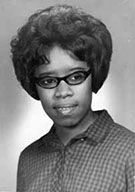
August 22, 1964 - Hazel Scott Taylor received a Master's in Education degree from Texas Tech. She may be the first African American to receive a graduate degree from the College of Education.
1965
In May, Stella Ruth Crockett Courtney (right) became the first African American to receive a B.A. degree from Texas Tech who had attended all of K-12 in Lubbock and attended all undergraduate years (non-transfer) at Texas Tech. (Stella Crockett Courtney oral history interviews, 2010 and 2014)
1967
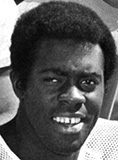
In February of 1967, Danny Hardaway (left) became the first African American athlete at Texas Tech to receive an athletic scholarship. He was also a charter member of the university's first black student organization. The group hosted educational and cultural programs focused on Black culture and sponsored visiting African American speakers and artists. (The University Daily, February 15, 1967; Texas Tech Today, February 14, 2019)
Dudley Johns was made an honorary member of the Saddle Tramps in recognition of the "virtue of his service to Texas Tech by his demonstration of outstanding school spirit". (The University Daily, April 15, 1967)
The Upward Bound program was established through a $72,000 grant from the Office of Economic Opportunity to help high school students from disadvantaged backgrounds develop academic skills that would help them attend college. Eleven instructional staff members were selected for the new program, including Dunbar High School faculty members Charles Henry and William Powell. The fifty students were selected from 250 applications to participate in the program (23 African American, 23 Latino, and 4 Caucasian) during the summer of 1967. Tech professor David B. Jordan served as the program's first director. (The University Daily, June 30, 1967 and November 21, 1967)
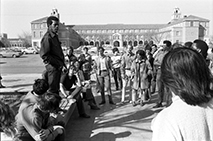
The Student Organization for Unity and Leadership (SOUL; right) was approved by the Board of Student Organizations on November 22, 1967, thus becoming the first official African American student organization at Texas Tech.
1968
Roy D. Anderson, a graduate of Texas Tech and Huston-Tillotson College, became the new director of the Upward Bound program.(The Manhattan Heights Program, November 28, 1968).
December 16, 1968 - Three student members of SOUL - Robert Wheatley, Janice Sherman, and Lawrence Williams - presented a list of 13 proposed policy changes to Dr. Owen Caskey, Vice President for Student Affairs. The suggestions included hiring more Black professors and administrators, recruiting more Black athletes, hosting more Black speakers, and serving "soul food" in dormitory cafeterias (The University Daily, December 17, 1968).
1969
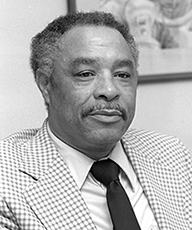
George Scott, Jr., (left) previously a science teacher and football coach at Dunbar High School, came to Texas Tech in 1969 as Assistant Dean of Students and part-time instructor in educational psychology. In a University Daily article dated September 11, 1984, Scott stated he was "the first black person to have a job in a professional capacity at Tech." (Texas Tech Today, February 19, 2019)
Danny Hardaway was listed as being a member of the Red Raider football team in the 1968-1969 football media guide, though no photograph is provided.
History 4340, the first Black history course taught at the university, hit full capacity on its first day of enrollment. Of the 35 students enrolled, only one was African American. (Lubbock Avalanche-Journal, September 13, 1969).
Three African American students met with the Director of Personnel, Fred Wehmeyer, to discuss employment of minority groups in non-teaching positions. This was a follow-up to the December 16th meeting between SOUL representives and Dr. Owen Caskey, in regards to a list of 13 suggestions the student organization had for university policy changes. (The University Daily, January 31, 1969)
1970
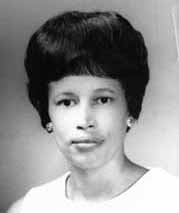
Dr. Hortense W. Dixon (right), who majored in Higher Education and minored in Home Economics, was the first African American to graduate with a doctorate from Texas Tech University. She graduated in August, 1970, and then went on to become an associate professor of Home Economics at Texas Southern University. (TTU Press Release 5-9-15-70 and photo)
For the 1970-1971 football season Texas Tech had 4 African American athletes - Danny Hardaway, Cedric Jones, Harold Lyons, and Quintin Robinson.
The Committee for Freedom, Understanding, Communication and Knowledge and SOUL's Race Forum held discussions and hosted speakers on race issues, including "the problems of black students at Tech," in front of the Student Union. Also shown was a film regarding the race situation in Lubbock. (The University Daily, February 24, 1970 and February 23, 1970).
African American Tech students discussed the need for more Black Studies courses, the creation of a Black Studies degree, and the hiring of more Black teachers and counselors at the university. Mentioned was the lone Black history course available and the sole Black staff member - George Scott Jr., Assistant dean of Student Life - at the time the article was published. (The University Daily, April 13, 1970).
The Elite Eta Lambda Chapter of Delta Sigma Theta was officially founded on April 17, 1970. It was acknowledged in the campus newspaper as being the first African American sorority to be established at Texas Tech. (The University Daily, September 23, 1970)
On September 1st, Thomas James (T.J.) Patterson began his new job as assistant to the Dean of the College of Business Administration. In that role he served in the capacity of a teacher, freshman advisor, and student recruiter. He held various administrative positions at the university in the College of Business until leaving in July of 1981.
Discussion of "voluntary segregation" by student groups in the University Center was featured on the front page of November 2, 1970 issue of The University Daily.
1971
Mrs. Hazel S. Taylor received the first Ford Foundation Advanced Study Fellowship for Black Americans at Texas Tech in July of 1971 while working on her doctoral degree in Education. Her son, Marshall, was also senior accounting major in the College of Business. (photo)
The first Black Week celebration, held March 8-12, was sponsored by SOUL and featured a variety of speakers, music and dance by the Langston Review, an "Afro Mod Fashion Show," a talent show and a "rap session" with Black author Charles Hamilton. Three films and panel discussions were also part of the week's activities. George Scott and T. J. Patterson were participants in the panel discussion for the film "Blossom." Black Week was described as an outgrowth of the previous year's "Black Day" which also included a film and panel discussion. (The University Daily, March 4, 1971).
A group of African American and Chicano students met with the Student Government Association to protest racial misrepresentations made in the Student Association Guide to Lubbock and Texas Tech - 1971-1972 publication, lack of equal broadcast time on KTXT-FM, and a lack of African American teaching faculty.
Bobbie Gean Bailey Patterson, wife of TJ Patterson, attended Texas Tech from spring 1971 - fall of 1972, earning a master's degree in education.
The Eta Upsilon Chapter of Alpha Phi Alpha fraternity was established at Texas Tech in 1971.
The Zeta Tau Chapter of the Alpha Kappa Alpha sorority was charted on the campus of Texas Tech University on December 6, 1971.
1972
On February 2, 1972, Emory Grant Davis was offered a 9-month teaching contract at the rank of Assistant Professor in the Department of Sociology. The position would begin in the fall semester and at a salary of $12,500. In the search committee's letter of recommendation to the Dean of Arts and Sciences regarding the job offer, the committee acknowledged "The consideration of Mr. Davis as a candidate was admittedly influenced by the needs of Texas Tech University for the first black faculty member to 'integrate' its faculty. From two different points of view, Davis is a much better candidate than we had any right to expect." Davis was a longtime minister of the African Methodist Episcopal Church and completed his Ph.D. from the University of Illinois-Chicago Circle in 1973. He resigned from Texas Tech in June of 1977 to go to Bishop College as chair of its Sociology Department.
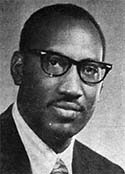 On February 2, 1972, Vivian Imogene Davis, wife of Emory Grant Davis, was offered a 9-month teaching contract at the rank of Assistant Professor in the Department of English. The position would begin in the fall semester and at a salary of $11,000. Davis completed her Ph.D. in June of 1973 from Northwestern University and had extensive prior experience teaching in public schools. In 1977 she, like her husband, accepted a teaching position at Bishop College in Dallas, Texas.
On February 2, 1972, Vivian Imogene Davis, wife of Emory Grant Davis, was offered a 9-month teaching contract at the rank of Assistant Professor in the Department of English. The position would begin in the fall semester and at a salary of $11,000. Davis completed her Ph.D. in June of 1973 from Northwestern University and had extensive prior experience teaching in public schools. In 1977 she, like her husband, accepted a teaching position at Bishop College in Dallas, Texas.
On June 1, 1972, Charles E. Henry (left), biology teacher at Coronado High School, began his appointment as instructor in the Department of Health Communications at the Texas Tech University School of Medicine, thereby becoming the School of Medicine's first Black full-time faculty member. Henry received his M.Ed degree from Texas Tech in 1971. (West Texas Times April 20, 1972)
William Dudley Johns retired as campus postman after 31 years of service. He began working at Texas Tech in 1941. He was profiled in The Daily Toreador April 21, 1965 and The University Daily June 28, 1972 issues. Additionally, "The Friends of Dudley Johns Scholarship" was established through the Tech Foundation. (For Your Information newsletter December 20, 1972)
For the 1972-1973 football season Texas Tech had 6 African American athletes - Calvin Jones, Harold Lyons, James Mosley, Quintin Robinson, Andre Tillman, and Kenneth Wallace. Selso Ramirez was the only Hispanic athlete pictured in the 1972 football media guide.
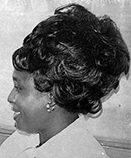
Ecomet Burley was one of the first Red Raider freshman to letter in football in the modern era and was named the Most Valuable Lineman in the 1972 Sun Bowl game.
1973
In June of 1973, Dr. Hazel S. Taylor (right) was offered a teaching position in the College of Education, from which she earned a doctoral degree on August 19, 1972. Taylor began her 9-month teaching appointing in the fall of 1973 as Assistant Professor at a salary of $12,200. She received tenure and was promoted to the rank of Associate Professor effective September 1, 1979.
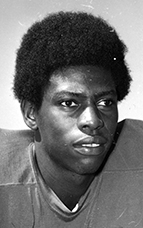
1974
Kenneth Wallace (left), one of three Lubbock Estacado High School recruits in February 1970, is cited as the first African American football player to graduate from Texas Tech. Awarded a full football scholarship as a defensive back, Wallace received his bachelor's degree in Physical Education on May 11, 1974, then was hired by the university as an assistant coach for the fall. (Everything Lubbock website)
1975
According to stories published in 1975 in the campus newspaper, Johnny Collins was asked by two other candidates to withdraw his name as a candidate for External Vice-President and run instead for Residence Halls Administration President. Collins, who was also president of the Saddle Tramps, did not withdraw his name and finished in second place when the election was held. In the March 10th issue Collins expressed his regret that the story had been published because "I think the story offended some people because they felt I was responsible. Those people probably voted against me. Then, on the other hand, I think the story also helped get me some support. So I guess you could say things probably evened out." (The University Daily, March 10, 1975) The newspaper's publishing of its endorsement of Collins' opponent the day of the elections was felt by Collins to be "inconsiderate" because it did not allow him, as well as the other candidates running for election, any opportunity for rebuttal. (The University Daily, March 14, 1975)
Later, Collins thanked his supporters in an editorial letter and stated that "The Black Cloud" would not stop growth. (The University Daily, March 19, 1975) The saga continued the following week with an editorial by a UD reporter who explained that the newspaper unfairly and openly backed Collin's opponent because it felt that Cowart was the best candidate. (The University Daily, March 21, 1975) In October the incident was brought up again when SA President Bob Duncan withdrew support for the SA Attorney General candidate Mike Smiddy in part over Smiddy's disagreement that the withdrawal incident with Collins was wrong. (The University Daily, October 21, 1975)
Leonard Childress, President of the Student Organization for Black Unity (SOBU; formerly known as SOUL), addressed the Student Association on ways Texas Tech Black students wanted help from SA, the academic and racial barriers they faced at the university, and mentioned his discussions with President Grover Murray on the creation of a minority cultural center on campus. (The University Daily, September 19, 1975)
1976
Native Lubbockite Diane Parson, a track runner from Estacado High School, was the first African American woman in Tech history to receive an athletic scholarship when she signed her athletic letter of intent in July of 1976. (The University Daily, p. 1 and 5, July 16, 1976)
Rick Bullock was named the Most Valuable Player in the inaugural Southwest Conference Post-Season Tournament.
Thomas James "TJ" Patterson was named "Man of the Year" in the 1976 La Ventana in honor of his contributions to the university and Lubbock and African American community. In addition to being a freshman advisor for the College of Business Administration Patterson was also serving as co-sponsor of the Saddle Tramps organization.
1977
With Eddie Richardson, TJ Patterson co-found the Southwest Digest, a local African American newspaper. (Link to the digitized newspaper issues)
English professor Vivian Davis, in response to a recent UD editorial stating whites were losing jobs to unqualified minorities, penned a fiery editorial pointing out that Texas Tech only had four black faculty members on staff, that the job market was changing, and the idea that a minority would get hired first over a white candidate was an absurd hiring myth. Davis and her husband, the first two African American faculty members hired at Texas Tech, departed the university in 1977 to join the faculty at Bishop College. (The University Daily, p. 2, February 14, 1977)
SOBU President Charles Gulley met with cheerleader sponsor Dr. Bill Dean over concerns of discrimination in the cheerleader selection process. The April 18th cover article in the campus newspaper ignited subsequent heated discussions. On KTXT-TV's Access program, Texas Tech President Cecil Mackey addressed the debate over lack of minority representation on the 12-member varsity cheerleading squad, stating "The cheerleaders are representatives of the university, and they have the responsibility to see that the nature of the squad reflects the values and ideas of the institution." Heated editorials on the subject matter and an announcement that a junior varsity cheerleading squad was being created to increase opportunities for minority representation are also included in the April 22nd issue of The University Daily
More editorials on equal representation appeared in the May 2nd issue of The University Daily. Gulley also submitted a signed petition on behalf of SOBU to the Lubbock Human Relations Committee charging four Lubbock discotheques of racial discrimination against Blacks and Chicanos. The city was set to act as mediator in the discrimination case.
1978
Eddie Dixon earned a Bachelor's of Science degree in Zoology in 1973 and a Bachelor's of Science degree in Chemistry in 1978.
1979
By 1979, membership in SOBU had grown to 75, up from 20 members in 1969 when the organization was known as SOUL. George Scott Jr. was sponsor of the organization during these ten years. (La Ventana, p. 338 of the PDF, 1979)
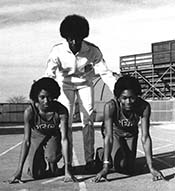
Page 304 of the same PDF for the yearbook also references a controversy regarding the Student Association's proposed fall semester budget allocation for certain campus organizations, including 34% going to the Student Organization for Black Unity (SOBU) and the United Mexican American Students (UMAS).
Former athlete Kenneth Wallace earned his master's degree in Physical Education from Texas Tech on December 20, 1979.
Former Olympian Jarvis Scott (right) was hired as the first head coach of the men's and women's cross country programs, thereby also making her the first head coach of the women's track and field programs. Scott would retain both roles until her retirement in 1991.
1980
As write-in candidate winning the position of second runner-up John Collins won the opportunity to compete in the runoff elections for March 26th. (The University Daily, March 14, 1980) He was the first African American student body president write-in candidate. The election was postponed after a University Daily article on the 25th was accused of prejudicing Collin's chances of winning the election. (The University Daily, March 27, 1980) Another article accused Collins of being fired by Kent Hance's office for misuse of a phone card (The University Daily, March 31, 1980). On April 2nd, Collins was declared the winner and became the first African American student body president. (The University Daily, April 3, 1980) On August 27th, he resigned from the position due to health issues. (Lubbock Digest, September 4, 1980)
As part of the Black Awareness Week activities, the Black Voices of Texas Tech performed Sunday morning at the First Baptist Church to demonstrate to "white students how Blacks worship". (The Lubbock Digest, March 31, 1980)" February 14, 1980)
1981
Sharon Moultrie was the first female Tech athlete, as well the first African American, to be elected Homecoming Queen by her peers. She was also the first athlete in TTU Women's Athletics to receive All-American honors (1980-1981 and 1981-1982 for long jump).
In June, T.J. Patterson left Texas Tech to become full-time co-publisher of The Southwest Digest newspaper.
James Gray, a football athlete from 1986-1989, was named Southwest Conference Newcomer of the Year in 1986. He was inducted into the Texas Tech Hall of Honor in 1981.
Eric Strong began serving as a program counselor for Texas Tech's Upward Bound program. He was director of the program from 1997 until his retirement in February 2007. Strong had a master's degree from the university.
1982
Lucille S. Graves, in a brief article in the February 25, 1982 issue of The Lubbock Digest (p. 10), recalled the discrimination she faced in the classroom as the first African American to take classes at Texas Tech. She also expressed her disappointment that, despite two decades passing, the situation for African Americans at the university had not improved for the better, other than maybe for athletes, nor were prospects for the students following graduation much better.
Joe Tucker, a UT Law School graduate and former assistant to State Attorney General Mark White, was the first Black professor hired at the Texas Tech School of Law. At the time of his hiring, only two Black students were taking courses in the program. (Southwest Digest, October 7, 1982)
1983
Brian C. Newby, a history major and Student Senate member, was commissioned as a distinguished graduate of the Air Force Reserve Officers' Training Corps program Texas Tech.
1984
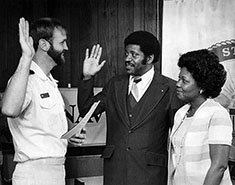
On April 7, 1984, T.J. Patterson (left) became the first African American elected to serve on the Lubbock City Council. He would hold that District 2 position for 20 years before being defeated in a runoff election by Floyd Price.
The 3rd Annual Texas Tech Reception for Black student was held in September.
Kenneth Wallace coached at Dunbar-Struggs High School. He was named Coach of the Year in 1981. In February of 1984, he was named head coach at Coronado High School, the first African American to hold such a position in the Lubbock Public School. By March of 1989, he was appointed principal of Estacado High School. (The Southwest Digest, February 23, 1984 and March 30, 1989 )
1985
Rick Bullock, a basketball athlete from 1973-1976, was the first African American to be inducted into the Texas Tech Hall of Fame. He was also inducted into the Texas Association of Basketball Coaches in 1985.
On January 3, 1985, Carolyn Thompson became the first Lady Raider to have her jersey retired. A member of the team from 1980-1984, Thompson was a three-time All-American and All-Southwest Conference Player by the time she graduated from the university.
1988
Track athlete Amanda Banks was named Southwest Conference outdoor champion in 1998 and 1989.
In May, the Minority Faculty and Staff Association, comprised of Black and Hispanic faculty and staff from TTU and TTUHSC, was formed. The organization served as a forum for discussion of educational issues related to minorities at TTU/TTUHSC and to work toward providing workable solutions to such issues.
1989
Members of the Black Student Association sent a letter dated March 2nd to Judith Henry, Dean of Students, expressing their concern over the number of racial incidents that had taken place on the Tech campus and campuses nationwide. (Reference File- Texas Tech: Minorities)
1990
On February 2nd, the ARCO Foundation presented the College of Engineering a $25,000 grant aimed at improving retention of under-represented minority students pursuing engineering degrees. The Minority Engineering Retention Program (MERP) was designed to ensure that Native American, Black and Hispanic engineering students at Tech complete their degrees.
1991
James Mays, a track and field athlete from 1978-1981, was inducted into the Texas Tech Hall of Honor.
1992
Artist Eddie Dixon installed his Buffalo Soldier monument, a tribute to the African American men who served in the U.S. Cavalry, at Ft. Levenworth, KS. General Colin Powell, Chairman of the Joint Chiefs, unveiled the monument during the national dedication ceremony. In honor of Dixon's seminal work, President George H. Bush declared July 26, 1992 as National Buffalo Soldiers Day. A postage stamp was issued featuring a likeness of the Buffalo Solider Monument.
Andre Tillman, a football athlete from 1971-1973, was the second African American to be inducted into the Texas Tech Hall of Fame.
September 26th, Sonya Myles became the second African American student crowned homecoming queen.
On October 21st, Sonya Myles, Alpha Kappa Alpha president, and Cheryl Taylor, Black Law Students Association president, filed a grievance with the Dean of Students Office regarding the October 9th "Party in the Projects" mixer sponsored by the Texas Tech Fashion Board and the Pi Kappa Alpha fraternity. They were accompanied by 75 minority students who supported the filing of the complaint, which accused participants of the mixer as portraying themselves as Blacks in a derogatory manner. Two days later, more than 1,000 students, faculty, staff, community members, and Judith Henry, Dean of Students, met in the Allen Theatre to have a heated discussion over the racial incident. In November, minority students held a rally in the Free Speech Area protesting Pi Kappa Alpha and Fashion Board's appeal of punishments issued by the Dean of Students Office. (The University Daily, October 22, 1992, October 23, 1992, and November 13, 1992; see also photo of Cheryl Page and Kimberly Maura).
The premiere of KTXT-FM's "Teen Talk" program was held on November 13th with primary topic of discussion focused on racism. Speakers scheduled to participate included IFC President David Fay and Black Law Students Association president Cheryl Taylor. (The University Daily, November 11, 1992)
1993
Bernard A. Harris Jr. was one of three new members of the Board of Regents appointed by Governor Ann Richards. He was the first African American to serve on the board.
Thomas Howard, a football athlete from 1974-1976, was also inducted into the Texas Tech Hall of Honor.
Bam Morris was named Team MVP and won the 1993 Doak Walker Award.
The Law School hosted on January 28th a forum on the constitutionality of hate speech. The event, co-sponsored by the Tech Federalist Society and the Black Law School Students Association, was held after the two student organizations who held the "Party in the Projects" mixer were released from all university sanctions. (The University Daily, January 28, 1993)
Following the Texas Attorney General's Office ruling that the "Party in the Projects" event was protected under the First Amendment, sanctions against Pi Kappa Alpha and Fashion Board were dismissed. Kappa Alpha Psi fraternity members began wearing black bandannas starting January 25th to display their dissatisfaction with the ruling. (The University Daily, February 2, 1993)
On February 1st, Black History Month kicked off in Memorial Circle. Balloons in shades of red, green, gold and black were released, the African flag was raised, and members of the Black Student Association and the Saddle Tramps wrapped the Will Rogers Statue in the African flag colors. BSA's theme for February was "Unifying us...our campus, our world." That same day, 200 students gathered in the free speech area to vocalize their unity against racism at Tech and to protest the upcoming Pikefest event. Three days later, a student installed a Confederate flag in Memorial Circle, sparking yet another outcry of racism. Additionally, several letters to the UD regarding campus racism appeared in the February 1st-9th issues. (The University Daily, February 1, 1993, February 2, 1993, February 8, 1993, and February 9, 1993)
February 19th was designated Unity Day by Tech officials in an attempt to reunite the campus and ease racial tensions. Lubbock Mayor David Langston and Regent Alan White participated in the Memorial Circle ceremony, where the university flag was raised to symbolize "the Tech community's commitment to resolving differences and the Victory bells rang simultaneously. 400 people participated in the event, with an estimated 40 protesters standing with their backs to the stage. (The University Daily, February 19, 1993 and February 22, 1993)
On February 27th, Alpha Kappa Psi hosted a "Shades of Gray" race relations workshop to help ease lingering campus racial tension. The event was co-sponsored by the Black Law Students Association and the Hispanic Student Society. (The University Daily, February 26, 1993)
Lubbock Mayor David R. Langston proclaimed March 28, 1993, as Eddie Dixon Day. Additionally, October 16, 1993 was proclaimed Eddie Dixon Day in Washington, D.C. and New York City, in honor of the artist's significant contributions to the fine arts.
1995
As Payload Commander on Space Shuttle Discovery STS-63 in 1995, Dr. Bernard A. Harris Jr., a graduate of Texas Tech's School of Medicine, served on the first flight of the joint Russian-American Space Program, becoming the first African American to walk in Space. (Link to NASA History page)
Michi Atkins, a member of the women's basketball team from 1993-1996, was named Southwest Conference Woman Athlete of the Year in 1995 and 1996.
The new east Lubbock library branch was named after T.J. Patterson and his wife, Bobbie Gean Patterson. Both took graduate classes at Texas Tech.
1996
Michi Atkins was named to the All-Time Lady Raider SWC Team and holds the distinction of being all-time leading scorer in SWC women's basketball history.
1997
Carolyn Thompson was the first woman and first African American woman to be inducted into the Texas Tech Hall of Fame.
In August of 1997, Cathy H. Allen began serving as Vice Chancellor for Multicultural and Community Affairs, making her, as of 2022, the highest ranking African American employee at Texas Tech University. After fulfilling this position for 9 years, Allen has served in a number of different roles at the university on both the main campus and Health Sciences Center campus.
1998
Sharon Moultrie-Bruner was second woman and second African American woman to be inducted into the Texas Tech Hall of Fame.
The annual Minority Law Student Forum at Texas Tech was co-sponsored, for the first time, by the Black Law Student Association, the Mexican American Law School Association, the Minority Law Student Association, the Minority Pre Law Society, and Women in Law. Guest speakers included Tech alum Judge Sam Medina, Paul Stafford, and Lubbock attorney Emilio Abeyta. (Southwest Digest, November 19, 1998)
The Texas Tech Ex-Students Association established the Black Alumni Council to increase African American involvement and to raise scholarship opportunities. The first meeting was held on October 10th at the Merket Alumni Center. Telea Johnson and Paul Stafford were among those who coordinated and hosted the event. (University Daily, October 12, 1998)
1999
Major Brian C. Newby was the second African American to be appointed to the Texas Tech Board of Regents, serving from 1999-2005.
The Friends of the Library and the Southwest Collection/Special Collections Library collaborated with Katie Parks, an outreach specialist at the Texas Tech School of Nursing Wellness, to author and publish Remember When? A History of African Americans in Lubbock, Texas, the first comprehensive history of Blacks in Lubbock County.
Melissa Hancock was crowned Homecoming Queen.
2001
Girls track and cross country coach at South Grand Prairie High School, Sharon Moultrie-Bruner was inducted into the Texas Black Sports Hall of Fame.
March 28-April 1, 2001 - The Graduate School hosted the 13th annual National Black Graduate Student Conference on the Tech campus. 300-500 graduate students from around the nation were projected to attend the conference.
2002
Football athlete Tyrone Thurman was inducted into the Texas Tech Hall of Fame.
2003
Basketball athletes Sheryl Swoopes and Will Flemons were inducted into the Texas Tech Hall of Fame.
Dr. M. Roy Wilson was appointed the new president for the Texas Tech University Health Sciences Center.
The Black Student Association and the Black Law Student Association sponsored a university diversity discussion with Regent Brian C. Newby leading the discussion.(The University Daily, October 3, 2003)
2004
Amanda Banks, a track athlete from 1986-1989 who was also selected as Southwest Conference outdoor champion in 1988 and 1989, was inducted into the Texas Tech Hall of Fame in 2004. Also inducted was Ecomet Burley, a football athlete from 1972-1975.
Additionally, Sheryl Swoopes, a basketball athlete from 1992-1993, was inducted into the Texas Tech Hall of Honor. Swoopes was a member of 1993 national NCAA championship team and is considered to be one of the most distinguished athletes in the university's history. She is a 3-time Olympic gold medalist and went on to lead the Houston Comets to three WNBA titles.
Jonathan Johnson was the only American athlete to advance in the semifinal round in track and field at the 2004 summer Olympics. Hewas also the first Red Raider to represent America in an individual sport at the Olympic games.
2005
James Hadnot, a football athlete from 1976-1979, was named Southwest Conference Offensive Player of the Year in 1978 and 1979. He was inducted into the Texas Tech Hall of Honor in 2005.
Also inducted into the Texas Tech Hall of Honor in 2005, Loyd Hill was a football athlete from 1990-1993 and was a member of the 1992 All-American Team.
2006
A scholarship honoring George Scott Jr., the first Black administrator at Texas Tech, was established by Kent Hance. (TTU press release April 22, 2006)
James C. Watkins, professor of Architecture and noted ceramic artist was the first African American to be promoted to the rank of Horn Professor, the highest and most selective academic rank for faculty at Texas Tech University.
2007
Jason Sasser, a basketball athlete from 1992-1996, and James Gray, a football athlete from 1986-1989, were inducted into the Texas Tech Hall of Fame.
Lubbock storyteller Eric Strong was winner of the Writers League of Texas' First Annual Oral Storytelling Competition. He described his winning tale, Going to See Ben Hur, "as a tale of hope which was inspired by true West Texas events from the Jim Crow Era during the late 1950s."
2008
As part of the Lubbock Centennial Celebration, Marcus Coleman was named to the All-Time Texas Tech football team. He was a former NFL player with the Jets, the Texans and the Cowboys.
Alicia Thompson, a basketball athlete from 1995-1998, was inducted into the Texas Tech Hall of Fame.
2009
Angie Braziel, a basketball athlete from 1997-1999 who was also selected as MVP of the Big 12 Post-season tournament, was inducted into the Texas Tech Hall of Honor in 2009.
The Timothy Cole Act was signed into law by Governor Rick Perry, providing those falsely convicted of a crime to be eligible for compensation for each year of incarceration.
Kenyan-born American athlete Sally Jepkosgei Kipyego enrolled in the nursing program at Texas Tech in 2007 and completed her degree in May of 2009. During her time at the university, she was a highly distinguished track athlete, garnering numerous awards and setting several race records. Besides being the first Kenyan woman to win an NCAA cross country individual championship, Kipyego was also one of only seven women in NCAA history to win four individual track titles during a single season.
2010
Marcus Coleman, a football athlete from 1992-1995, and Montae Reagor, a football athlete from 1995-1998, were inducted into the Texas Tech Hall of Fame. Reagor was also named Team MVP in 1997 and 1998.
On April 25, 2010, the Texas Tech chapter of the Collegiate 100 Black Men was chartered.
Dr. aretha marbley (Education) was the first African American female faculty member to be promoted to full rank.
2011
In April, the Texas Tech chapter of the Collegiate 100 Black Women was chartered. Both the men's and women's organizations removed the "Black" moniker in 2013 and consolidated into one organization in 2014 named The Texas Tech Chapter of Collegiate 100. (Link to The Collegiate 100)
Texas Tech joined the Southwest Regional Alliance with six other research universities to form a next-generation alliance aimed at increasing and retaining minority students who pursue STEM doctoral degrees. (Link to Texas Tech Today article)
Wendy Tolson Ross (Law School) was the second African American female faculty member to be promoted to full rank.
2012
Bam Morris, a football athlete from 1991-1993, and Ricky Williams, a football athlete from 1997-2001, were inducted into the Texas Tech Hall of Fame.
Sally Kipyego, representing Kenya, earned a silver medal in the 10,000 meters race at the 2012 Summer Olympics.
2013
Rodney Blackshear, a football athlete from 1987-1991, was inducted into the Texas Tech Hall of Fame.
2014
A Texas Tech student in 1985, Timothy B. Cole was arrested and convicted of rape of a fellow Texas Tech student. He died in prison in 1999. Ten years later, he was exonerated of the charges through DNA evidence and pardoned by Governor Rick Perry in 2010. A 13-foot memorial statue in Cole's honor, oriented looking toward the Texas Tech campus from which Cole was expelled following his arrest, was erected at the corner of University Avenue and 19th Street. The unveiling ceremony, held on September 17, 2014, was attended by members of the Lubbock and Texas Tech community, as well as Attorney General Greg Abbott and state Senator Wendy Davis. (Link to article) The Law firm of Glasheen, Valles and Inderman funded the $250,000 statue, sculpted by local artist Eddie Dixon.
Carolyn Thompson and Rick Bullock, both former basketball athletes at Texas Tech, were inducted into the Southwest Conference Hall of Fame on April 7th. At the time of her induction, Thompson was the record holder for career points by a men's or women's basketball player at Tech with 2,655. (Link to TexasTech.com article)
On August 30th, Michi Atkins, Amanda Banks, Gabe Rivera, and Andre Tillman were among the 11 former Red Raiders inducted into the Southwest Conference Hall of Fame. (Link to TexasTech.com article)
Formerly known as Black Grad, Black Convocation was re-established in 2014 by Beneita Ilesanmi and a few other students to spotlight the achievements of Black students at Texas Tech University. Participants in the ceremony receive Kente Stoles to wear at university commencement ceremonies. (More information can be found at Black Convocation at Texas Tech University)
2015
On May 15th, Timothy B. Cole was posthumously awarded an honorary degree from Texas Tech, which was accepted on his behalf by his siblings.
The Caviel Museum of African History, the first African American museum in West Texas, opened in June at the corner of Avenue A and 17th Street in Lubbock, Texas. The building was originally Caviel's Pharmacy, owned and operated by African American couple Alfred and Billie Caviel. Eric Strong, founder of the museum, was a driving force in the Lubbock Roots Historical Arts Council, of which he was currently serving as director, and was a notable community advocate.
Delroy Poyser, a track athlete from Jamaica, competed for Texas Tech from 1982-1985. He held the distinction of being the third male athlete in university history to be an All-American in track and field. Poyser was inducted into the Texas Tech Hall of Fame in 2015. He passed away four years later.
2016
Former Lady Raider Sheryl Swoopes was inducted into the Naismith Memorial Basketball Hall of Fame on September 9, 2016.
Jonathan Johnson, a track and field athlete from 2002-2005, and Jia Perkins, a basketball athlete from 2000-2004, were inducted into the Texas Tech Hall of Fame.
Terry Cook was inducted into the West Texas Walk of Fame. Cook made his debut at the famed Metropolitan Opera in 1983 and rose to prominence as an international opera star.
2017
On June 10th, Sheryl Swoopes was one of six inductees into the Women's Basketball Hall of Fame.
Connie Robinson, a basketball athlete from 1993-1995, and Shereefa Lloyd, a track and field athlete from 2004-2005, were inducted into the Texas Tech Hall of Fame.
2018
Sean Lewis was elected Student Government President, serving from May 1, 2018-May 1, 2019.
Dr. Carol A. Sumner was appointed Vice President of the Division of Diversity, Equity and Inclusion on June 18, 2018.
Cory Powell, Director of Mentor Tech, was the first African American to serve as Chairman of the Lubbock Chamber of Commerce. As chairman, Powell spearheaded the Chamber's first Diversity and Inclusion Summit in 2018.
Erin Grant, a basketball athlete from 2002-2006, and Andre Emmett, a basketball athlete from 2001-2004, were inducted into the Texas Tech Hall of Fame.
2019
During the February 21st Big 12 Conference on Black Student Government, Stephanie Odigie and Cabel Morris became the first Texas Tech students to be recognized by the Council on Black Student Government and win the Big 12 Black Caucus Award. Texas Tech was official inducted into the organization the prior year. (Link to The Daily Toreador article)
At the end of May, Sean Lewis, who had just graduated with a bachelor's degree in history, was appointed by Governor Abbott to serve as the TTU System Student Regent effective June 1, 2019 to May 31, 2020.
Davian Hopkins, editor of the La Ventana yearbook, was the first student editor to win the Pacemaker award three times. He won the award for the 2016, 2017 and 2019 volumes of the yearbook. He did not serve as editor for the 2018 volume.
The Eric E. Strong Memorial Grove tree dedication ceremony was held on June 14, 2019, in Mae Simmons Park.
Inducted into the Texas Tech Hall of Fame for 2019 were Jarrius Jackson, a basketball athlete from 2004-2007; Dwayne Slay, a football athlete from 2004-2005; Sally Kipyego, a track and field athlete from 2006-2009; and Shawon Harris, a track and field athlete from 2004-2006 and 2008.
2020
On February 2nd, former Red Raider football player Patrick Mahomes, as a member of the Kansas City Chiefs, became the third youngest quarterback in NFL history to win the Super Bowl MVP award as well as the second youngest player to ever win a Super Bowl. He is also cited as the youngest player, and first quarterback, to win both a Super Bowl and league MVP before his 25th birthday. (Link to USA Today article)
Due to the COVID-19 pandemic, Texas Tech held its May 23rd graduation ceremonies virtually, a first in the university’s history. Patrick Mahomes, Kansas City Chiefs quarterback who attended Texas Tech and played football from 2014-2016, served as the guest speaker for the ceremonies.
A distinguished 1984 graduate of Texas Tech University's Air Force ROTC program, General Charles “C.Q.” Q. Brown Jr. was unanimously confirmed by the U.S. Senate on June 9th as the new Chief of Staff of the United States Air Force. The appointment makes him the first black chief of a military service branch. He will also be the first black officer to sit on the Joint Chiefs of Staff since Army Gen. Colin Powell served as chairman from 1989 to 1993. Brown earned his bachelor’s degree in civil engineering from Texas Tech and was named a distinguished alumnus in 2012. (Link to Texas Tech Today article)
Earnstein Dukes began her appointment as Dean of the TTU Libraries on August 1st, making her the first African American at the university to hold the position of dean.
Patrick Mahomes and General Charles “C.Q.” Q. Brown Jr. were honored among Time magazine's 100 Most Influential People of 2020.
The Division of Diversity, Equity & Inclusion hosted a "Black Women in the Academy" panel discussion and recognition ceremony for Black female faculty at the university. Participants in the discussion were Earnestine Dukes, Naïma Moustaïd-Moussa, Faith Maina, Mary W. Murimi, and Wendy Tolson Ross.(Link to Texas Tech Today article)
2021
Naïma Moustaïd-Moussa, Professor of Nutritional Sciences and Director of the Texas Tech Obesity Research Cluster was the second Black faculty member and the first female Black faculty member to attain the rank of Horn Professor.
After receiving her master's degree in interdisciplinary studies from Texas Tech in May, Blessing Okagbare, a Nigerian-born athlete who previously competed in two Olympic Games, was scheduled to compete in her third Olympic run during the Tokyo games. She placed silver in the 2008 Beijing Olympics in the long jump category.
By placing third in the U.S. Women's Olympic Trials Marathon on February 29, 2020, Sally Jepkosgei Kipyego secured a second trip to the Summer Olympics. As U.S. citizen (since 2017), Kipyego will participate as a member of the U.S. Olympic team in the 2020 Summer Olympic games in Tokyo.
Rick Bullock was listed among the top 100 Texas high school basketball players in celebration of the UIL's 100th anniversary celebration.
Donovan Satchell was the first African American to be crowned Homecoming King.
2022
Track and Field Head Coach Wes Kittley announced on February 16th the last regular season indoor track and field meet at Texas Tech would be named in honor of former head coach Jarvis Scott.
In May, former Texas Tech basketball guard Darvin Ham, who spent four seasons as assistant coach for the Milwaukee Bucks, was named head coach of the Los Angeles Lakers.
June 6, 2022 - Carla Holland was named the new director of the Northwest Texas Small Business Development Center, a Texas Tech grant funded program designed to help guide and train small business owners and aspiring entrepreneurs.
September 9, 2022 - Grand opening of the new Black Cultural Center at 2533 15th Street. It was the first of its kind on campus and included a new TTU branch library, The Peters Family Legacy Library, endowed by Rawls College of Business alum Brenda J. Peters, and supervised by new Assistant Librarian Uriel Onye.
Tomisin Alausa was crowned Homecoming Queen.
October 29, 2022 - Patrick Mahomes was inducted into the TTU Hall of Fame and Hall of Honor.
2023
For Texas Tech's charter (founding) centennial, the Texas Tech University Archives curated a large exhibit titled "Education Has No Color: Celebrating Black History at Texas Tech" that will be on display in the Library's Croslin Room from January 17-March 16, 2023.
Dr. Raegan Higgins, Department of Mathematics and Statistics, was promoted to the rank of professor.
2024
Cory Carr, a basketball athlete from 1994-1999, Omo Osaghae, a track athlete from 2007-2011, and Ifeatu Okafor, a track athlete from 2010-2013, were among the six former Red Raiders inducted into the Texas Tech Hall of Fame on November 8th.
Telea Stafford Jackson received the Texas Tech Alumni Association Distinguished Service Award at the October 18, 2024 "A Matador Evening" awards dinner.
October 18, 2024 - Dr. Cheryl "Shelly" Taylor Page, 1993 Texas Tech Law School graduate and founder of the school's Black Law School Student Chapter, was the invited speaker for BLSA's "Past, Present, and Future Discussion Panel."
Back to the Texas Tech History Pages
